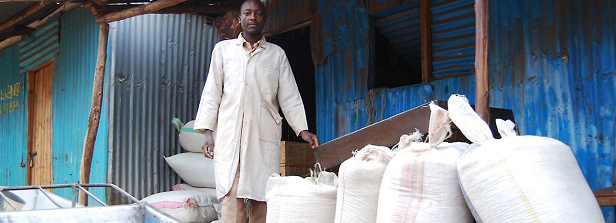Agribusiness development and trade
Small and medium enterprises

Image: via Flickr (by: Energy for All 2030)
Development of small and medium enterprises (SMEs) emerges as a key instrument in poverty reduction efforts, as it is a major source of employment. The focus is on SMEs that are active in agro-food value chains and those whose businesses depend on such value chains.
Academic article
Article
Report
Research paper
Working paper
Africa
Asia
East Africa
Global
Kazakhstan
Kenya
Malawi
Malaysia
Papua New Guinea
Philippines
Sri Lanka
Sub-Saharan Africa
Tanzania
Uganda
Zimbabwe
2016
2015
2014
Remove all filters
Filter results
Results found:
February 15th, 2016
Published by PNAS, January 12th, 2016
The analysis in this article uncovers the drivers for the variation in household food availability in sub-Saharan Africa. It suggest that targeting poverty through improving market access and off-farm opportunities is a better strategy to increase food security than focusing on agricultural production and closing the yield gaps. The analysis builds on data from 93 sites in 17 countries in sub-Saharan Africa, across contrasting agro-ecologies and calculated a simple indicator of food availability. »
December 8th, 2015
Published by Farm Africa, November 3rd, 2015
This report (PDF) by Farm Africa, highlights how support to small and medium agriculture businesses is key to driving rural economic development in East Africa. These ‘first mile’ businesses play a vital role in connecting small-scale farming to wider markets by buying their produce or supplying goods to them. This report maps the various financial instruments that should be provided for agricultural SMEs’ needs, enabling them to grow. »
November 24th, 2015
Published by Asian Development Bank, October 29th, 2015
This study (PDF) by the Asian Development Bank and the Asian Development Bank Institute examines ways of encouraging SME participation in value chains, and explores policy solutions to address the financial and nonfinancial barriers faced by SMEs in global value chains. The authors highlight that two main factors
require attention: 1) enterprise competitiveness and 2) enterprise connectivity. »
October 29th, 2015
Published by OECD and World Bank Group, October 6th, 2015
This report (PDF) from the OECD and the World Bank focuses on making global value chains (GVCs) more inclusive. This is achieved by overcoming participation constraints for Small and Medium Enterprises (SMEs) and facilitation access for Low Income Developing Countries (LIDCs). »
June 18th, 2015
Published by Asian Development Bank Institute, February 18th, 2015
This paper (PDF) by the Asian Development Bank Institute examines the characteristics of SMEs in in global value chains (GVCs) and free trade agreements (FTAs) and explores the policy implications. It finds that among SMEs, firm size matters for participation in GVCs and FTAs. But size is not the whole story for SME internationalization. Licensing... »
May 19th, 2015
Published by USAID, February 11th, 2015
This report by USAID and ACDI/VOCA (PDF) presents an assessment of agri-business small and medium enterprises (ASMEs) in Malawi. It was found that this is a sector with diversified business ownership, in which owners commonly operate multiple businesses and can be classed as ‘portfolio’ owner-managers spanning both agri-business and non-agri-businesses. A portfolio enables them to... »
May 14th, 2015
Published by Oxfam & Shujog, November 1st, 2014
This report by Shujog, commissioned by Oxfam, analyses the effectiveness of development programs in addressing challenges faced by Small and Medium Enterprises (SMEs) in the agriculture sector in Asia. The purpose of this report is to inform the decision-making of development programs that aim to catalyze the growth of Social Enterprises (SEs) in agriculture and... »
April 23rd, 2015
Published by SNV, June 24th, 2014
This case study highlights how SNV helped create an enabling ecosystem for small and medium enterprises (SMEs) through access to finance and business development services. SNV, with support from Hivos and other partners, established the Zimbabwe Agricultural Development Trust (ZADT) in the pursuit of their common objective of providing sustainable financial support to value chain actors. »
April 2nd, 2015
Published by Agriculture for Impact, June 1st, 2015
This report (PDF) from the Montpellier Panel argues that investment in rural and food sector entrepreneurship, particularly amongst Africa’s growing youth population, can do more than achieve sustainable food and nutrition security for the continent: it can create jobs, wealth and robust livelihoods. The report’s recommendations include: (i) the establishment of programmes in order to... »
March 3rd, 2015
Published by Sustainable Match, March 1st, 2014
Sustainable Match is an initiative of six complementary Dutch parties (Agri-ProFocus, BBO, MVO Nederland, Oxfam Novib, PeopleConnector, ProPortion) that has been executed between 2012 and 2013 on innovating trade and investment missions in anticipation of the new policy for international cooperation of the Dutch Ministry of Foreign Affairs (PDF). By means of two pilots in... »
March 3rd, 2015
Published by Dare, March 1st, 2014
This paper (PDF) published by Dare provides an empirical description of the patterns and determinants of non-farm entrepreneurship in rural Africa, using the World Bank’s unique LSMSISA dataset on six countries: Ethiopia, Niger, Nigeria, Malawi, Tanzania and Uganda. The research finds that non-farm entrepreneurship predominantly creates informal jobs and mostly for family members; that these... »
